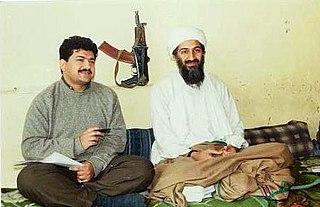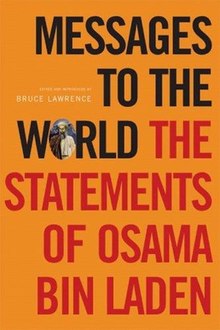![<span class="mw-page-title-main">Al-Qaeda</span> Pan-Islamic Sunni Jihadist [[terrorist organization]] (established 1988)](https://upload.wikimedia.org/wikipedia/commons/thumb/3/30/Flag_of_Jihad.svg/320px-Flag_of_Jihad.svg.png)
Al-Qaeda is a pan-Islamist militant organization led by Sunni Jihadists who self-identify as a vanguard spearheading a global Islamist revolution to unite the Muslim world under a supra-national Islamic state known as the Caliphate. Its members are mostly composed of Arabs, but also include other peoples. Al-Qaeda has mounted attacks on civilian, economic and military targets of America and its allies; such as the USS Cole bombing, 1998 US embassy bombings and the September 11 attacks. The organization is designated as a terrorist group by NATO, UN Security Council, the European Union, and various countries around the world.

Osama bin Mohammed bin Awad bin Laden was a Saudi-born militant who was the founder and first general emir of al-Qaeda from 1988 until his death. Ideologically a pan-Islamist, his group is designated as a terrorist group by the United Nations Security Council, the North Atlantic Treaty Organization (NATO), the European Union, and various other countries.
There were several video and audio recordings released by Osama bin Laden between 2001, 2004, 2005 and 2011.
War against Islam is a term used to describe a concerted effort to harm, weaken or annihilate the societal system of Islam, using military, economic, social and cultural means, or means invading and interfering in Islamic countries under the pretext of the war on terror, or using the media to create a negative stereotype about Islam. The perpetrators of the theory are thought to be non-Muslims, particularly the Western world and "false Muslims", allegedly in collusion with political actors in the Western world. While the contemporary narrative of the "War against Islam" mostly covers general issues of societal transformations in modernization and secularization as well as general issues of international power politics among modern states, the crusades are often narrated as its alleged starting point.
Michael F. Scheuer, is an American former intelligence officer for the Central Intelligence Agency, blogger, author, commentator and former adjunct professor at Georgetown University's Center for Peace and Security Studies. One assignment during his 22-year career was serving as Chief of the Bin Laden Issue Station from 1996 to 1999. He also served as Special Advisor to the Chief of Alec Station from September 2001 to November 2004.

On October 29, 2004, at 21:00 UTC, Al Jazeera broadcast excerpts allegedly from a videotape of Osama bin Laden addressing the people of the United States; in this video, he accepts responsibility for the September 11 attacks, condemns the Bush government's response to those attacks, and presents those attacks as part of a campaign of revenge and deterrence motivated by his witnessing of the destruction in the Lebanese Civil War in 1982. News analysts speculated that the release of the video was timed to influence the 2004 U.S. presidential election, which would take place four days later.
Jamal Ahmed al-Fadl is a Sudanese militant and former associate of Osama bin Laden in the early 1990s. Al-Fadl was recruited for the Afghan war through the Farouq mosque in Brooklyn. In 1988, he joined Al-Qaeda and took an oath of fealty to Bin Laden. After a dispute with Bin Laden, al-Fadl defected and became an informant to the United States government on al Qaeda activities.
Osama bin Laden authored two fatāwā in the late 1990s. The first was published in August 1996 and the second in February 1998. At the time, bin Laden was not a wanted man in any country except his native Saudi Arabia, and was not yet known as the leader of the international terrorist organization al-Qaeda. Therefore, these fatāwā received relatively little attention until after the August 1998 United States embassy bombings, for which bin Laden was indicted. The indictment mentions the first fatwā, and claims that Khalid al-Fawwaz, of bin Laden's Advice and Reformation Committee in London, participated in its communication to the press.

Holy War, Inc.: Inside the Secret World of Bin Laden is a book by CNN investigative journalist and documentarian Peter Bergen. It was published in November 2001, two months after the September 11 attacks, and was a New York Times Best Seller in 2001.

Rogue State: A Guide to the World's Only Superpower (ISBN 1-56751-374-3) is a book by William Blum first published in 2000. The 3rd revision updates events covered in the book to the year 2005. It examines and criticizes United States foreign policy during and following the Cold War. The book's first chapter is titled "Why Do Terrorists Keep Picking on the United States". Subsequent chapter titles include "America's Gift to the World — the Afghan Terrorist Alumni", "The U.S. Versus the World at the United Nations" and "How the CIA Sent Nelson Mandela to Prison for 28 Years". The book was published in several languages including Arabic.
Osama bin Laden, the founder and former leader of al-Qaeda, went into hiding following the start of the War in Afghanistan in order to avoid capture by the United States and/or its allies for his role in the September 11, 2001 attacks, and having been on the FBI Ten Most Wanted Fugitives list since 1999. After evading capture at the Battle of Tora Bora in December 2001, his whereabouts became unclear, and various rumours about his health, continued role in al-Qaeda, and location were circulated. Bin Laden also released several video and audio recordings during this time.

On May 2, 2011, Osama bin Laden, the founder and first leader of the Islamist militant group al-Qaeda, was shot and killed at his compound in the Pakistani city of Abbottabad by United States Navy SEALs of SEAL Team Six. The operation, code-named Operation Neptune Spear, was carried out in a CIA-led mission, with the Joint Special Operations Command (JSOC) coordinating the Special Mission Units involved in the raid. In addition to SEAL Team Six, participating units under JSOC included the 160th Special Operations Aviation Regiment (Airborne), also known as the "Night Stalkers", and the CIA's Special Activities Division, which heavily recruits from former JSOC Special Mission Units. The success of the operation ended a nearly decade-long manhunt for bin Laden, who was accused of masterminding the September 11 attacks on the United States.
The September 11, 2007 Osama bin Laden video appeared five days after the September 6, 2007, Osama bin Laden video, on the sixth anniversary of the September 11 attacks. It is the second video produced by As-Sahab purportedly featuring a eulogy by Osama bin Laden to the 9/11 hijacker Waleed al-Shehri.

Hamza bin Osama bin Mohammed bin Awad bin Laden, better known as Hamza bin Laden, was a Saudi Arabian-born member of Al-Qaeda. He was a son of Al-Qaeda leader Osama bin Laden, and, following his father's death in 2011 and the attacks on the World Trade Center in New York City, he was described as an emerging leader of the Al-Qaeda organization.
Osama bin Laden, a militant Islamist and reported founder of al-Qaeda, in conjunction with several other Islamic militant leaders, issued two fatawa – in 1996 and then again in 1998—that military personnel from the United States and allied countries until they withdraw support for Israel and withdraw military forces from Islamic countries. He was indicted in United States federal court for his alleged involvement in the 1998 U.S. embassy bombings in Dar es Salaam, Tanzania and Nairobi, Kenya, and was on the U.S. Federal Bureau of Investigation's Ten Most Wanted Fugitives list until his death.

Osama bin Laden took ideological guidance from prominent militant Islamist scholars and ideologues from the classical to contemporary eras, such as Ibn Taymiyya, Ibn al-Qayyim al-Jawziyyah, Sayyid Qutb and Abdullah Azzam. During his middle and high school years, bin Laden was educated in Al-Thager Model School, a public school in Jeddah run by Islamist exiles of the Muslim Brotherhood; during which he was immensely influenced by pan-Islamist ideals and displayed strict religious commitment. As a teenager, bin Laden attended and led Muslim Brotherhood-run "Awakening" camps held on desert outskirts that intended to raise the youth in religious values, instil martial spirit and sought spiritual seclusion from "the corruptions" of modernity and rapidly urbanising society of the 1970s in Saudi Arabia.
Osama bin Laden (1957–2011), a militant and founder of Al-Qaeda in 1988, believed Muslims should kill civilians and military personnel from the United States and allied countries until they withdrew support for Israel and withdrew military forces from Islamic countries. He was indicted in United States federal court for his involvement in the 1998 U.S. embassy bombings in Dar es Salaam Tanzania and Nairobi, Kenya, and was on the U.S. Federal Bureau of Investigation's Ten Most Wanted Fugitives list.

The September 11 attacks were carried by 19 hijackers of the Islamist militant organization al-Qaeda. In the 1990s, al-Qaeda leader Osama bin Laden declared a holy war against the United States, and issued two fatāwā in 1996 and 1998. In the 1996 fatwā, he quoted the Sword Verse. In both of these fatāwā, bin Laden sharply criticized the financial contributions of the American government to the Saudi royal family as well as American military intervention in the Arab world.
At around 9:30 pm on September 11, 2001, George Tenet, director of the Central Intelligence Agency (CIA) told President George W. Bush and U.S. senior officials that the CIA's Counterterrorism Center had determined that Osama bin Laden and al-Qaeda were responsible for the September 11 attacks. Two weeks after the terrorist attacks on September 11, 2001, the Federal Bureau of Investigation connected the hijackers to al-Qaeda, a militant Salafist Islamist multi-national organization. In a number of video, audio, interview and printed statements, senior members of al-Qaeda have also asserted responsibility for organizing the September 11 attacks.

The death of Osama bin Laden on May 2, 2011, gave rise to various conspiracy theories, hoaxes and rumors. These include the ideas that he had died earlier, or that he lived beyond the reported date. Doubts about bin Laden's death were fueled by the U.S. military's supposed disposal of his body at sea, the decision to not release any photographic or DNA evidence of bin Laden's death to the public, the contradicting accounts of the incident, and the 25-minute blackout during the raid on bin Laden's compound during which a live feed from cameras mounted on the helmets of the U.S. special forces was cut off.

![<span class="mw-page-title-main">Al-Qaeda</span> Pan-Islamic Sunni Jihadist [[terrorist organization]] (established 1988)](https://upload.wikimedia.org/wikipedia/commons/thumb/3/30/Flag_of_Jihad.svg/320px-Flag_of_Jihad.svg.png)







